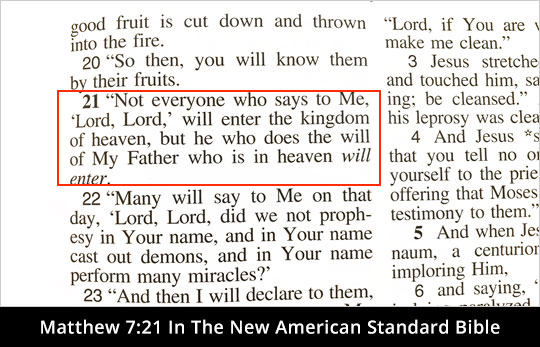Bible Question:
In verse Mathew 7:21 what is the meaning of the word does. You use ongoing behavior to describe/reflect
Bible Answer:
The meaning of the word “does” is extremely important in Matthew 7:21.
“Not everyone who says to Me, ‘Lord, Lord,’ will enter the kingdom of heaven, but he who does the will of My Father who is in heaven will enter.” Matthew 7:21 (NASB)
Therefore, the following explains the meaning of the Greek word that is translated as “does” in this verse.

Meaning of the Greek Translated As “Does”
Nothing about the meaning of the Greek words in Matthew 7:21 is unique. The Greek word that is translated as “does” is poieo. The word appears 598 times in the New Testament. It is translated as “do.” F. Thiele states,
The verb poieō, attested since Homer, and generally to be trans. to do, to make, has passed through a varied development. It is the basic term for all activity.[1]
Johannes P. Louw and Eugene Albert Nida agree with the definition given by Thiele when he says the word means,
. . . to do or perform (highly generic for almost any type of activity)—‘to do, to act, to carry out, to accomplish, to perform, doing, performance.’[2]
It has been demonstrated that the Greek word for “does” refers to action that performs an activity. This word is a verb and not a noun.
Tense of the Greek Verb Translated As “Does”
Since poieo is a verb, we must also determine the meaning of its tense, voice and mood. The tense of poieo in Matthew 7:21 is in the present tense. Poieo in the present tense refers to action that is ongoing.[3] For example, when Jesus said, “he who does the will” He was referring to ongoing action at that moment in time. In a previous Q&A titled, “What is the will of the Father in Matthew 7:21?” the following was stated about the meaning of the word “does.”
That is, no one is going to heaven unless he or she is doing the Father’s will. The Greek word for “does” is a Greek present participle which implies ongoing behavior. The person who does the will of God once in a while does not qualify. Jesus is describing someone who habitually does the will of the Father.[4]
Poieo is also in the active voice, which means that when Jesus said, “. . .he who does the will of My Father who is in heaven will enter” He was saying that the individual must be performing the action.
Because poieo is a participle, this means the verb refers to continuous action. R. C. Lenski says,
The two durative present participles legon and poion describe customary actions . . . This “doing” proves that a real connection . . . [5]
Grant Osborne states,
“A life of obedience (present tense “do” [Ποιωv] for continuous action) to his will is, in fact, the definition of righteousness . . .”[6]
In summary, when Jesus says “. . . but he who does the will of My Father who is in heaven will enter.” The word “does” is a present, active, participle verb which means that those who continuously are doing the will of the Father go to heaven. Jesus was referring to a pattern of life and not perfect obedience.
Conclusion:
The character of true Christians is that they sin less and less as they mature in their faith.
Little children, make sure no one deceives you; the one who practices righteousness is righteous, just as He is righteous; the one who practices sin is of the devil; for the devil has sinned from the beginning. The Son of God appeared for this purpose, to destroy the works of the devil. No one who is born of God practices sin, because His seed abides in him; and he cannot sin, because he is born of God. By this the children of God and the children of the devil are obvious: anyone who does not practice righteousness is not of God, nor the one who does not love his brother. 1 John 3:7-10 (NASB)
The message of these verses is that those who have been [judicially] declared righteous will not be practicing sin habitually. Those [judicially] declared righteous will habitually live righteously. That is, true Christians will increasingly be doing God’s will. But doing God’s will does not make a person a Christian. In fact, non-Christians cannot do God’s will because the Holy Spirit is not living within them to help them.
References:
1. F. Thiele, “Ποιέω,” ed. Lothar Coenen, Erich Beyreuther, and Hans Bietenhard. New International Dictionary of New Testament Theology. Regency Reference Library. 1971. vol. 3, 1153.
2. Johannes P. Louw and Eugene Albert Nida. Greek-English Lexicon of the New Testament: Based on Semantic Domains. (New York: United Bible Societies, 1996), p. 511.
3. Gresham Machen. New Testament Greek. MacMillan Co. 1951. p. 104.
4. John Calahan. What is the will of the Father in Matthew 7:21? www.neverthirsty.org/bible-qa/qa-archives/question/what-is-the-will-of-the-father-in-matthew-721/).
5. R. C. H. Lenski. Luke. Commentary on the New Testament. Hendrickson Publishers. 1961. p. 305.
6. Grant R. Osborne. Matthew. Exegetical Commentary on the New Testament. Zondervan. 2010. p. 273.
Suggested Links:
What is the will of the Father in Matthew 7:21?Please explain what went wrong in Matthew 7:21?
What is Lordship salvation? What does the Bible teach?
Searching For God
How do you receive Christ? What does John 1:12 mean?
Must a person repent in order to go to heaven?
Must we confess Jesus as Lord with our mouth to be saved?
What does it mean to receive Christ?
Does 1 Timothy 4:16 teach that Christians can lose their salvation?